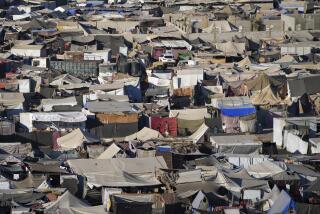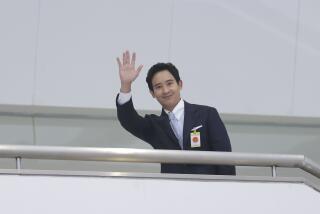Egypt’s pro-democracy activists feel their grip slipping
Sensing the revolution that overthrew President Hosni Mubarak is slipping from their grasp, activists and opposition groups are pressuring the ruling military council to postpone Egypt’s elections in September amid fears that Islamists and members of the former regime will gain too much power.
The attempt by fledgling political parties to win more time to organize coincides with a renewed push to draft a new constitution before the parliamentary elections so that no political bloc, especially the Muslim Brotherhood, will have unchecked influence to set the laws of the land.
The pressing concern among independents and secularists is that the Brotherhood, the nation’s largest and best-organized party, may win about 25% of the seats in parliament and control even more through a coalition. This could give the organization the power to infuse the new constitution with conservative Islamic ideals to limit rights for women and non-Muslims.
“The Brotherhood is tyrannical in its opinions and views, and I think they will take the side of the Islamist businessmen who fund it and have strict Islamic ideologies,” said Khalid Sayed, a member of the Jan. 25 Youth Coalition. “Whatever constitution they might form would not fulfill the demands of Egyptians for civil rights and democracy.”
The other worry is that members of the former ruling National Democratic Party will run as independents or merge with new parties. Mubarak, his sons and his Cabinet ministers are facing corruption trials, but many businessmen and tycoons at the core of the NDP still have the clout to manipulate clans and regional leaders to deliver votes from the Nile Delta to the southern deserts.
“It’s a rotten policy,” said Mamdouh Hamza, an engineer and longtime dissident who is guiding many young activists. “The Muslim Brotherhood and the former NDP members could win 90% of the vote if elections are held in September. That means the real revolutionary powers and the silent majority will get nothing.”
Hamza’s math may be too generous to the Brotherhood and holdover NDP politicians, but it indicates that burgeoning political parties, some of them lacking the 5,000 required signatures to register, cannot compete against more entrenched forces.
His passion also reveals that the revolution that toppled Mubarak in February is an unfinished battle among secularists, clerics, the old political guard and emerging players with pretty phrases and little experience. The country that inspired the Arab world with a whirlwind 18-day revolt is in the midst of a messy drama to reinvent itself after nearly 30 years of repressive rule.
Activists and liberals argue on talk shows for keeping the revolution vigorous and pure. But the sound of unity that once echoed through Tahrir Square has splintered into a discordant mix of power plays and self-interests.
“The liberals have failed to form a true ideological party that knows the street language of the people,” said Shady Ghazali Harb, a leader of the revolution who has formed his own party.
Evolving alongside this clamor is the stirring of a new political Islam. Young members of the Muslim Brotherhood and more radical Salafist sects are increasingly disenchanted with the rhetoric and ideologies of their elders. The youth are breaking away to form their own parties and factions in a quest for an identity that better speaks to the democratic aspirations of the uprisings sweeping the region.
The nation’s political imbalance has led interim Prime Minister Essam Sharaf to call for a delay of the September poll. It was a move to calm activists and political parties calling for nationwide protests July 8 and seeking to collect 15 million signatures on a petition to support drafting a constitution before elections.
The military council appears to want to quickly hand over the government to elected officials while retaining a large degree of power behind the scenes. More than 77% of Egyptian voters in a March referendum agreed to hold early elections but to only amend the current constitution, which would later be rewritten by a parliamentary committee. To undo the results of the referendum would lead to questions about the military’s authority and why it vetoed Egyptians’ first exercise in real democracy.
“Calls for forming a constitution prior to elections are a coup against democracy,” said Essam Eryan, vice president of the Brotherhood’s new Freedom and Justice party. “Political powers calling for a constitution show a lack of trust in their capabilities to compete in elections and lack of trust in their own presence among Egyptians.”
With its chances of winning a large swath of parliament, the once-banned Brotherhood quickly attacked proposals to set new parameters for elections and the constitution. These pressures come as its youngmembers complain that the old guard is inept at politics and too religiously conservative for today’s Egypt. A youth faction has rejected the Freedom and Justice party and has helped form another political group.
This split widened last week when the Brotherhood expelled Abdel Monem Aboul Fotouh, a prominent member supported by the youth who defied the party by running as an independent for president. The group had decided not to enter a candidate in the presidential election, scheduled for December. The developments suggest the divisions within the organization are more pronounced now that the Brotherhood is free of persecution from Mubarak’s police state.
The Brotherhood is also encountering challenges from moderate clerics over Islam’s influence on the government. Founded in 1928, the group has not been clear on its religious designs for the constitution, but its ideological rigidity and comments about women and Coptic Christians in the past have worried human rights groups. Last week, Al Azhar University in Cairo, the center of Sunni Muslim thought in the Arab world, called for a “modern, democratic” nation that is open to other faiths.
But given the lack of a unifying vision from secular and youth parties growing out of the revolution, the Brotherhood is likely to remain the nation’s dominant political voice.
“Egyptians sympathize with the Brotherhood not only because of the group’s use of religious slogans, but also because it’s a self-financed organization whose members stand in contrast to their competitors,” political analyst Amr Chobaki wrote in the newspaper Al Masry al Youm. “Unless Egypt can produce a civilian political current born out of domestic political, economic and cultural concerns, the Brotherhood will continue to be the chief political power in Egypt.”
Amro Hassan in The Times’ Cairo bureau contributed to this report.
More to Read
Sign up for Essential California
The most important California stories and recommendations in your inbox every morning.
You may occasionally receive promotional content from the Los Angeles Times.










